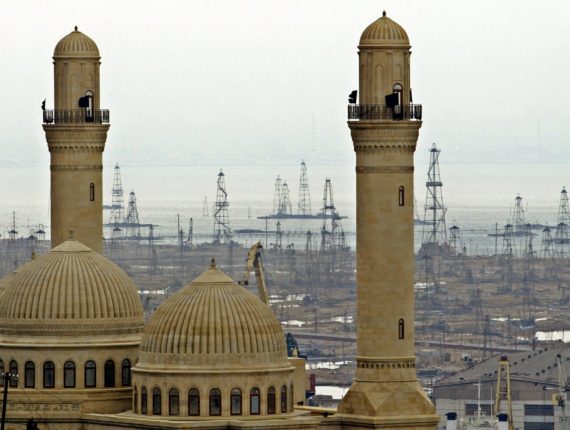
The Seattle Times
By Aya Batrawy
March 7, 2019

FILE – This March 3, 2006 file photo, shows oil derricks in the background beyond the Bibi Heybat Mosque in Baku, Azerbaijan. A group of evangelical pastors from the U.S. is visiting the predominantly Muslim Shiite nation of Azerbaijan to promote interfaith dialogue and highlight cooperation with Israel. New York-based Rabbi Marc Schneier, who led the delegation, told The Associated Press from the capital of Baku on Thursday, March 7, 2019, that this was the first ever Christian evangelical delegation to visit Azerbaijan. (AP Photo/Mikhail Metzel, File)
DUBAI, United Arab Emirates (AP) — A group of evangelical pastors from the U.S. visited the predominantly Muslim Shiite nation of Azerbaijan to promote interfaith dialogue and highlight cooperation with Israel, with pastors saying Thursday the visit has already challenged their views about the potential for coexistence in America’s polarized landscape.
New York-based Rabbi Marc Schneier, who led the evangelical delegation, told The Associated Press from the capital of Baku that this was the first ever Christian evangelical delegation to visit Azerbaijan.
Most of Azerbaijan’s population of 10 million are Shiite but it’s also home to Sunnis, Christians and around 30,000 Jews, said the rabbi. The country shares borders with both Iran and Russia.
The group, which included 12 U.S. pastors, met President Ilham Aliyev, the foreign minister, Muslim sheikhs, local church leaders, and Israel’s ambassador.
Schneier said Aliyev announced during the delegation’s visit that the country’s first-ever Jewish cultural center would be built in Baku with Kosher dining options and a hotel to accommodate Jewish guests.
The delegation also visited a Jewish school where children sang Hebrew songs for Israel.
“I literally had to pinch— I had to pinch myself,” Schneier said. “Here I am in a Muslim majority country being welcomed into a Jewish school with all these Jewish children singing Israeli songs. It’s just a phenomenon that one would be able to experience anything like that.”
Schneier heads the Foundation for Ethnic Understanding based in New York and founded The Hampton Synagogue in Westhampton Beach, New York. He is at the forefront of building ties between Jews and Muslims in the U.S. and the Middle East. Through greater interreligious dialogue, he’s pushed for closer relations between Muslim leaders and the state of Israel.
Last year, there were visits by U.S. evangelicals to Saudi Arabia and the United Arab Emirates— two countries seeking to strengthen ties with the Trump administration through his evangelical base of supporters. The outreach is happening as Gulf Arab states simultaneously take their once-private outreach to Israel more public and work to isolate Iran.
Unlike Arab Gulf states, Azerbaijan already has diplomatic relations with Israel, its national carrier flies direct to Tel Aviv and its president hosted Israel’s prime minister in 2016.
Pastor Adam Mesa, who leads the Abundant Living Family Church in Rancho Cucamonga, California, said it was his first time in a Muslim majority country. He was encouraged to take part in the trip because of Azerbaijan’s supportive Israeli stance and interreligious efforts.
For many U.S. evangelicals, support for Israel is at the very core of their faith. Most believe that before Jesus can return, Jews have to go back to the Holy Land. They also believe the return of the Messiah will follow the rebuilding of the Jewish Temple in Jerusalem, also the site of Islam’s sacred Al-Aqsa Mosque compound.
“There’s been this polarization in our country that we’re supposed to be separatists from one another and we’re supposed to not interact with one another,” Mesa said. “It’s incredible that a Muslim majority country is the one that has to actually lead the charge on religious dialogue and community and solidarity.”
He said his talks in Azerbaijan with Catholics, Jews and Muslim sheikhs held no friction, resentment or prejudging.
“I think we really need to bring that attitude back to America,” he said. “I really want to emphasize that to my church and other political leaders.”
Pastor Calvin Battle, who leads Destiny Christian Center in Tulsa, Oklahoma, described the visit as “absolutely incredible”. It was also his time visiting a Muslim country and his first time in a dialogue with sheikhs and learning “how similar” the Abrahamic faiths are.
“I have to admit it’s kind of impaired my ignorances concerning the area and the region and what I came in with, presuppositions concerning the people,” he said.
More than just promoting inter-religious tolerance, Azerbaijan too sees political currency in its outreach with Christians and Jews.
“From a political point of view, listen there is no question you know that Azerbaijan is looking to strengthen its relationship with the U.S. administration, with the United States Congress. Israel is very much a conduit to that,” Schneier said.
Azerbaijan’s president has maintained close ties with the West, helping protect its energy and security interests and to counterbalance Russia’s influence in the strategic Caspian region. At the same time, Aliyev’s government has long faced criticism in the West for alleged human rights abuses and suppression of dissent.
Copyright © 2025 Foundation For Ethnic Understanding. All rights reserved. | Privacy Policy